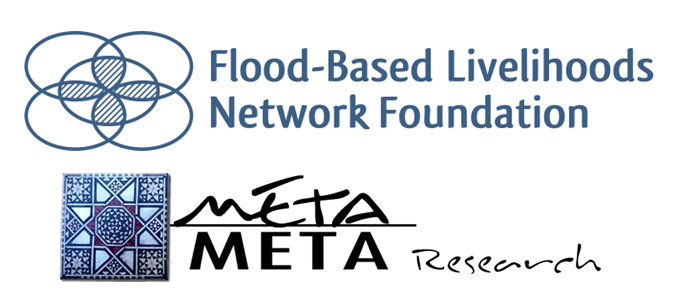

Dear readers,
We have prepared a new Newsflash for you full with updates from the network, including the newest resources and papers published. Feel free to share your feedback, news or ideas with us through info@floodbased.org.
Enjoy the reading!
Topics in this newsflash
- TMT Training in Yemen
- Spate Irrigation @ UN Water Conference in New York
- Updates from Pakistan
- Sudan – Development is the Gash Spate System
- Kenya – Green Roads for Water is growing
TMT Training in Yemen
The Water and Environment Centre, part of Sana’a University recently initiated the Water Rights System for Peace and Equality Training for stakeholders from the Spate Irrigation systems in Yemen, including Tihama. A group of 50 participants, from the different wadi’s participated through strong engagement and commitment. Tihama is known as the food basket of Yemen, contributing greatly to food security in the country.
Within the group there were 12 people from Tihama and others from the Supreme Agricultural Committee, Bunyan (NGO), Ministry of Agriculture and Irrigation, FAO, UNDP.
During the training each Wadi has developed a plan around water rights. One of the outcomes however is that water rights enforcement is still needed, and essential.
For resources on the spate systems in Tihama check:
- The Economic Value of Irrigation Water in Wadi Zabid, Tihama Plain, Yemen
- Participatory rural appraisal to assess groundwater resources in Al Mujaylis Tihama Coastal Plain Yemen
- The War Impact on Food Security in the Tihama Region. Case Study: Wadi Zabid and Wadi Siham


Spate Irrigation @ UN Water Conference, New York
On behalf of the Flood Based Livelihoods Network, David Mornout participated in the Water and Heritage: Connecting Past, Present and Future session, organised as side-event to the UN Water Conference, recently held in New York.

Updates from Pakistan
The New Water Rights For Basin Management And Inclusivity In Spate Irrigated Areas Of Pakistan (Newarbi) was recently visited by a delegation of the funding organisation (Netherlands Enterprise Agency – RVO). As part of the visit, the team visited the project site in Nai Gaj (Sindh) for interaction with the established farmer networks and to see the infrastructural improvements that have been carried out as part of the project. A clear conclusion from the visit is the importance and strength of locally grounded community organisations, such as the Joint Management Committees that have been established in the project areas. Besides their role in the improving of the Water Management, they took up an essential role in several community services, initiatives and advocacy, strengthening the community.

Following the visit the project team was engage in the development of ‘Water Security’ plans for the Spate Irrigation areas affected by the floods. These were presented to the Chief Secretary of Irrigation of Balochistan Province. Part of the plans is the development of infrastructure to protect the canal irrigated areas in Balochistan and Sindh, but also to utilize the flood water for agriculture.



Lastly, the team in Balochistan reported on the completion of the Flow Divider structures, which is funded through the Balochistan Government, as contribution to the project.
The constructed flow divider works with a fixed division for the three canals that are fed. The division is based on the area to be irrigated from the spate floods and is determined by the width of the opening. The outlet for Buledi wah is 15ft wide while the outlet for Musa wah is 26ft wide and the outlet for Mahram is 52 feet respectively.

Together with the construction of the flow divider a number of canals have been rehabilitated through the removal of silts that accumulated over the years.

Finally we wanted to share a beautiful areal picture of spate irrigation in one of the watersheds in Balochistan. It beautifully shows how the valley bottom is utilized for crop production, using the hill torrents and flood water.

Sudan – Developments in the Gash Spate System
The team in Sudan has been involved in the Gash spate irrigation area in Sudan for a number of years. Recently a number of activities were rolled out, amongst them the installation of a solar powered grinding mill operated with trained community members which will relieve women from the back- breaking, health threatening, labour manual practice. Women can now have much free time to invest in other income generating activities.
Another aspect of the work is the ongoing canal maintenance, to ensure the floods will reach the allocated fields. The 10 km canal maintenance will supply 12000 acres and benefit 4000 farmers or nearly 20000 farming family members.
Furthermore a bridge is under construction which cuts the difficult muddy journey from the village to the Kassala highway from 20 km to under one km. Some 40000 inhabitants of the 13 villages will have improved access to better health and market centers in the vibrant Kassala town. The bridge will be a major contributor to significantly reducing pregnancy and delivery related mortality rates – which is now unfortunately high.
A women development centre is nearing completion and will have all the basic facilities to serve as a hub for training and income generation activities – the centre can also in itself generate income by providing meeting and training services to others




Kenya – Green Roads for Water
In Kenya the Green Roads for Water concept, part of the Flood Based Livelihoods approach, is increasingly receiving attention from stakeholders, including significant government buy-in. Recently on of the ambassadors in Kenya, Micheal Maluki was during the World Forest Day recognised as Environment Champion in recognition of his work to champion Road Runoff Harvesting for Roadside Tree planting.
Linked-in post


